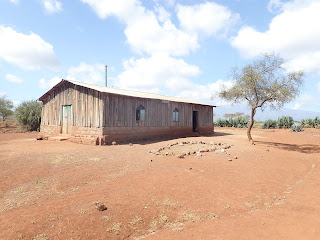As the sun dropped to the west of Illasit. I stood on a hill to contact Tim Challen, the Kili Initiative director, in Geneva. Somehow a signal connected us and my friend asked, “How is everyone?”
“Better than good. They made it here on their own. It’s not easy for anyone to read a map.”
“That’s why we bring them out there. To find their own way. I’ll call you tomorrow.”
I hung up, wondering what were the charges for a long-distance call from Kenya to Switzerland, as I descended the rocky slope to our campsite on the Illasit middle school grounds.
Dinner wasn’t ready and Ma’we suggested a walk into town.
JM said, “Don’t be too long.”
“Just taking my brother to see our world.”
We strolled away from the middle school down a narrow defile. Young girls and women stood behind a wired fence preparing the evening meal. Two guards in their forties stood at the gate. Ma’we explained, “That is a shelter for women fleeing Female Genital Mutilation or sexual violence. The guards take them back and forth to school. They are safe here from ’emorata’.”
The guards shouted out his name and Ma’we waved to them, as we continued down the path.
“You seem to know everyone.”
“I taught school here. A long time ago. I had a small room. I slept on the sleeping bag and stored it in the rafters. All the students said I slept on the floor. I never told them different and these people thought I was one of them, but they are Maasai.”
“Warriors.” I was familiar with the spearmen from Tarzan’s BROTHERHOOD OF THE SPEAR.
Proud warriors too.”
“This town grew when other tribes opened shops. Commerce gave everyone money. The Maasai were jealous and called for a meeting atop that hill.”
“They told the other tribespeople they had twenty-four hours to leave and gave them a beating to show they were serious. The pother people left and within a year the town was only friends with the wind. The Maasai want people to come back, but everyone went somewhere else. Still they do have beer here.”
“Sounds good to me.”
I wasn’t scared of anything.
Especially with Ma’we at my side.”
Few trees had survived over-pasturization.
Dust was the main crop aside from cattle.
Everyone greeted Ma’we by name.
Some houses were closed for good and I imagined the ghost of the old occupants had also been exiled to other lands.
“Here we are.”
“This is a bar.”
“With Guinness.”
I am Irish and entered the bar with eagerness.
We entered the bar.
A few young men chewed ghat in the corner. The stimulant was popular throughout East Africa.
“Ghat has been in Africa since the Pharaohs and it is legal in Kenya,” explained Ma’we with disapproval.
The table offered me some of the leaf. I shook my head and Ma’we signaled for beer.
The Guinness was not cold. Electricity was saved for the overhead fan. Guinness was still good for you.
And even better with my new friends.
After an hour the mayor and his brother wished us good luck.
“Tumunyana.”
It was night and after the gas station the stars guided us through the shadows back to the school.
No one could ever calculate their number. I lost track after a billion.
Drinking three Guinness didn’t help my math and neither did my fingers, but I needed them to count us.
We were two.
Ma’we and me.
And up ahead I spotted a fire.
Our campsite.
Our friends.
Food.
Tents.
Sleep.
In Africa.
I was happy, but looked behind me.
I was happier to not see glowing eyes, because the night belongs to the hyenas on the Maasai Plains.



















